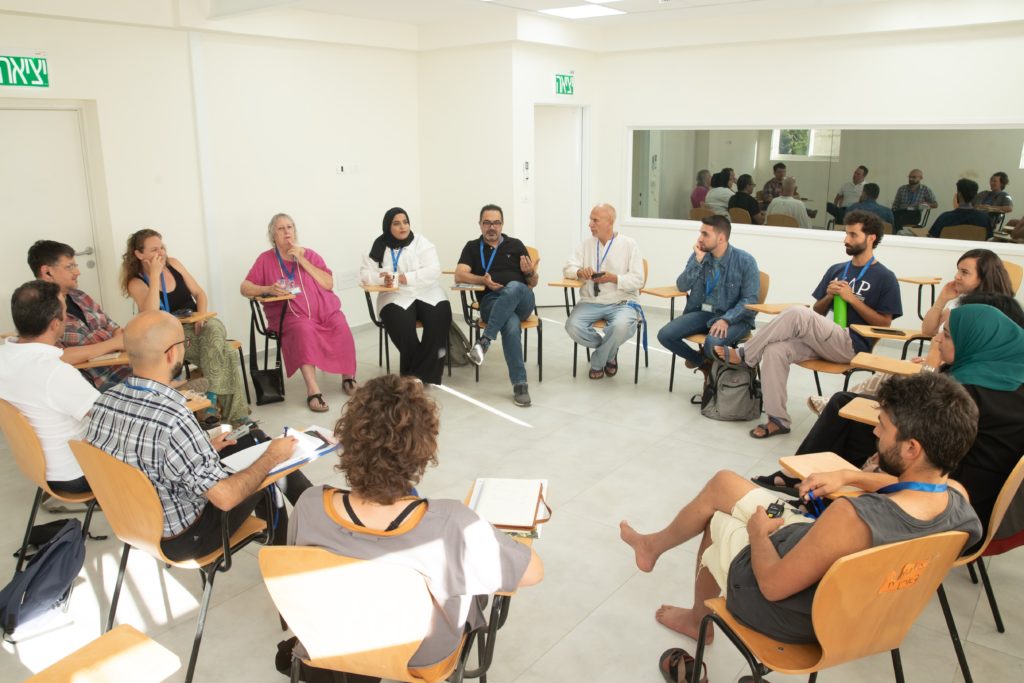A two-day intensive Palestinian-Jewish dialogue on liberation
“The Palestinians dared to ask whether they truly want liberation and can take responsibility for managing a liberated society, while Jews grappled with the fear of giving up privileges and the contradiction of demanding nonviolent struggle from Palestinians while insisting on maintaining the Israeli army.“
A two-day intensive Palestinian-Jewish dialogue on liberation
as part of the 3rd annual alumni conference of the School for Peace, June 2024.
In an intensive two-day dialogue process between Palestinians and Jews, all graduates of previous activities of the School for Peace, we talked about the topic of liberation. At the height of the war, during the most extreme and brutal period in terms of violence and polarization, we chose this topic to begin marking the path to the liberation of all of us. While usually in our dialogues the group deals with the topic of oppression, this time we advanced to conversations in new realms: conversations about the future, about the day after. And not through the perspective of one political agreement or another, but through the perspective of questions about liberation – what will it look like? How does each side perceive liberation? What is our responsibility in promoting liberation? What do Palestinians and Jews liberate themselves from? And what is each side unwilling to let go of? Can each side really imagine themselves as liberated? What are the costs of liberation?
Dialogue is the central tool of the School for Peace, aimed at raising awareness of the ongoing oppression and power relations between national groups, allowing each participant to explore their position concerning the political reality, and encouraging taking action from a sense of responsibility and agency. As our main tool, dialogue is also the central tool of the conference. Participants were divided into four fixed groups, each with 14-20 participants. The ratio between Palestinians and Jews was about 1:3, with a majority of Jews. The dialogue spread over the two days: three sessions in a bi-national forum and two sessions in a uni-national forum. Each group was facilitated by two facilitators from the School for Peace: a Palestinian facilitator and a Jewish facilitator. The conversation was conducted in Hebrew and Arabic, with simultaneous translation available for each group.
This year, we invested particularly in the dialogue at the conference, holding several preparatory and processing meetings for the facilitators before, during, and after the conference in order to maximize the dialogue’s ability to lead to a significant process. The facilitators and participants testified to a powerful and profound process that everyone went through. The choice of the topic of liberation itself opened the door to a somewhat different conversation than usual; one facilitator put it that usually in the School for Peace dialogues, we talk about oppression, and at the conference, we began to talk about something else, about the future and liberation from oppression. This conversation was not easy. The topic of liberation exposed deep fears that we had not touched on before. In the dialogues we had in the groups since the war, we heard a lot about the fear of Jews following October 7th of the lost of personal security and from the violence of the massacre. Alongside this, we heard about the fear of Palestinians from the heavy silencing they are experiencing since the war and the fear of annihilation in Gaza. But at the conference, the dialogue managed to touch on additional fears, such as the fear of the very idea of liberation, of being liberated. Jews expressed concern about liberating themselves from their privileged status and, for example, giving up the army. Palestinians expressed concern about taking responsibility for society and the political reality after liberation – questions arose about how to manage a free society after so many years of oppression.
In the bi-national dialogue, questions arose about the relations and partnership, and what each group expects from the other. The question arose about each side’s role in liberation, what each side’s responsibility is in the liberation process and the day after? There were also difficult feelings of depression and despair about the situation, and mutual disappointments between the sides – some Jews wanted more recognition of their pain from the events of October 7th, and some Palestinians were angry at the Jews for their part in the oppressive situation.
The uni-national dialogue allowed for deeper exploration of difficult questions that had not been asked before, mainly about taking responsibility for liberation and the costs of liberation. Palestinians discussed whether they really want liberation and whether they can take responsibility for managing a liberated society. Jews confronted the fear of giving up privileges and the contradiction of demanding non-violent resistance from Palestinians while simultaneously insisting on maintaining the Israeli army.
Alongside the difficult feelings, many participants shared the actions they are involved in on the ground, from protective presence in the West Bank to anti-war activities abroad. Many participants reported that the joint gathering strengthened them, and the opportunity to speak and deepen their thinking together allowed for the liberation of thought from oppression and the liberation of speech from silencing, as a significant step towards forming a liberation consciousness.
__

